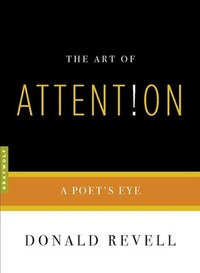Take a photo of a barcode or cover
I'm going to try and not be flippant. In order to save you time and money, I will condense Donall Revell's book, The Art of Attention: A Poet's Eye, to one sentence.
Pay attention.
For those of you who have time for more than two words, I'll expand to three sentences.
1. Pay attention.
2. Fall in love with the world.
3. Write.
That aside, Revell does spend considerable time on select poems. Those instances are worth reading, but can become tiresome as the same points are reiterated.
Pay attention.
For those of you who have time for more than two words, I'll expand to three sentences.
1. Pay attention.
2. Fall in love with the world.
3. Write.
That aside, Revell does spend considerable time on select poems. Those instances are worth reading, but can become tiresome as the same points are reiterated.
slow-paced
This book seemed to be far more religiously doctrinal than about poetics. I was excited to read it as I'm highly interested in the idea of attention as being important, even central, to writing poetry. If I didn't have to read this book for class, though, I wouldn't have finished it. It was so preachy, focusing on the "purity" of poetry and casting it in such a one-dimensional light. There were a few good excerpts, those of which got this book to merit 2 stars, but overall hard to get through. A major simplification of such a complex art form.
Unfortunately, as a craft book, this is a waste of time and money. Perhaps his argument is immanent: the world is argument enough for beauty in itself, and does not need to be imposed upon by ego/argument/formalism for formalism's braggadocio. Pay attention! Perhaps it is because "attention" has been of so much focus in our "distracted" era this book did not age well. Who knows? Gross, I am writing this review in the style of the book.
It was intriguing as a sort of literary coming-of-age memoir of Revell, discussing how his own poetics changed and how his life events impacted. He seems like a nice person, and he loves poetry! This book made me wonder, "who edited this thing?"
It was intriguing as a sort of literary coming-of-age memoir of Revell, discussing how his own poetics changed and how his life events impacted. He seems like a nice person, and he loves poetry! This book made me wonder, "who edited this thing?"
Donald Revell starts out by saying that duration shapes a poem. That as you observe and reveal what you see the poem grows. Sounds simple. He uses examples from Denise Levertov, and Charles Olson.
He says, "I have a real dislike for the term "writer's block," a term that seems to imply an altogether fictional urgency. Nobody ever needs to write a poem, and how in the world can an absence prove a present impediment?" I do not use the term writer's block so resonated with this assertion, but I do feel the need to write poems.
There were two exercises in his discussion of translation that he uses when he teaches. (page 71) He refers to Apollinaire and has made me curious to read Samuel Beckett's translations.
The book is a 'should read' book for me and I had to force myself to finish it. He used his own successive books to review and analyze his poetry. I found his elevated language book distracting. The word antinomian for example. I frequently look up words as needed when I read poetry; but coming from the school of Dangerous Writing, where the simple understandable word is preferred, I found it frustrating as the book progressed. This word comes out of theology, it relates to a doctrine, he uses it in a sentence, " As it turns out the optic nerve is an antinomian."
I'm sure there is a lot more I can say, I've started reading The Art of Time in Memory by Sven Birkerts and I am loving it. I also learned Mark Doty is writing on for the seried The Art of Discovery (I think, it's in the new journal Oranges & Sardines). I'm excited to continue reading this series.
He says, "I have a real dislike for the term "writer's block," a term that seems to imply an altogether fictional urgency. Nobody ever needs to write a poem, and how in the world can an absence prove a present impediment?" I do not use the term writer's block so resonated with this assertion, but I do feel the need to write poems.
There were two exercises in his discussion of translation that he uses when he teaches. (page 71) He refers to Apollinaire and has made me curious to read Samuel Beckett's translations.
The book is a 'should read' book for me and I had to force myself to finish it. He used his own successive books to review and analyze his poetry. I found his elevated language book distracting. The word antinomian for example. I frequently look up words as needed when I read poetry; but coming from the school of Dangerous Writing, where the simple understandable word is preferred, I found it frustrating as the book progressed. This word comes out of theology, it relates to a doctrine, he uses it in a sentence, " As it turns out the optic nerve is an antinomian."
I'm sure there is a lot more I can say, I've started reading The Art of Time in Memory by Sven Birkerts and I am loving it. I also learned Mark Doty is writing on for the seried The Art of Discovery (I think, it's in the new journal Oranges & Sardines). I'm excited to continue reading this series.
Revell's lyrical writing style nearly made this book unreadable for me, as I would get lost in the rhythm and rhyme of the words he used and completely miss what they actually meant. It's an excellent bedtime read. I will say that if you're looking to get introduced to the "form" of poetry, and how to read like a poet, this is an excellent guide. Included are some delightful snippets of works from other poets, and some of Revell's own works. A bit boring and honestly presumptuous in places, hypocritical in others, a bit hard to really get into, but linguistically quite beautiful.




